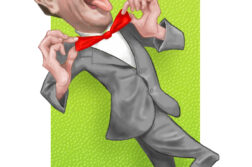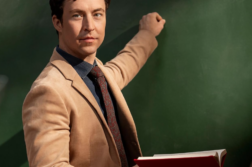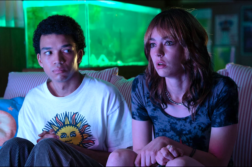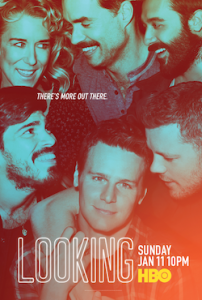 Looking
Looking
Written by Michael Lannan
Directed by Andrew Haigh
HBO
IN 1954, Frank O’Hara wrote a bold poem that celebrates “taking off our masks” in the pursuit of “complete candor.” He gave his lyric an even bolder title, “Homosexuality,” as it’s partly about cruising Manhattan—”14th Street is drunken and credulous,/ 53rd tries to tremble but is too at rest”—but also about a deeper desire for something real in the romantic sense. “It’s a summer day,” he concludes, “and I want to be wanted more than anything else in the world.”
Exactly sixty years later, HBO has created a TV series called Looking, as in the hook-up lingo for wanting “no strings attached” or NSA sex ASAP. A few episode titles flesh out the series’ blunt name: “Looking for Uncut,” “Looking for $220/ Hour,” “Looking at Your Browser History,” “Looking for…”—you get the idea. O’Hara’s lyric could serve as the template for this subtle gem of a series from writer
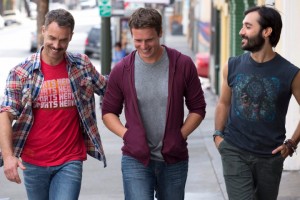
Michael Lannan and British director Andrew Haigh. The fact that Looking, which is set in San Francisco, revolves around a circle of friends has drawn inevitable comparisons to the network’s other shows on friendship, such as Sex and the City and Girls. True, Patrick (played by Jonathan Groff) is something of the show’s Carrie Bradshaw, minus the advice column and Manolo Blahniks, but he is, like the part immortalized by Sarah Jessica Parker, looking for love and sex or something in between. Yet Looking is only occasionally driven by punch lines—it’s full of nervous laughter rather than comic bombast—and it has a more realistic tone than these earlier series.
Patrick actually makes a passing reference to Frank O’Hara in the series pilot. A Colorado native, Patrick is a video game designer who’s beginning to despair in the world of online dating. “It makes me nauseous,” he says, “but I can’t stop looking.” Call it the daily Grindr of contemporary gay existence. Showing a potential date to a coworker, Patrick exclaims: “He’s got a line from Frank O’Hara on his profile!” “Like you even know who that is,” his friends shoots back. “He’s a poet,” says Patrick, but adds without missing a beat: “I had to look it up.”
Patrick is such a babe in the woods that the pilot episode opens with his failed attempt at cruising in a public park. “Cold hands!” he cries before his cell phone rings and he laughingly ends the encounter. Cut to Patrick’s description of the experience to best friends Agustín and Dom. (The latter remarks to another friend that on your fortieth birthday, Grindr sends you a death certificate.) What’s fresh about the men’s banter is their total lack of shame, including “bottom shame” (as the show terms it). If Looking tells us anything about “the Zeitgeist,” it’s that Patrick and company freely resist the walking clichés that one has come to expect from prime-time TV. That Esquire criticized Looking for being boring, precisely because it lacks a character like Jack of Will & Grace, says a lot about straight expectations.
Looking also suggests that being a young (or youngish) gay man in this day and age—and yes, the cast is almost exclusively male and depressingly so, except for Dom’s roommate, a brassy “fag hag” cliché who adds nothing—is about having options. When Dom, Agustín, and Agustín’s boyfriend Frank tease Patrick about his voicemail message for sounding “gay,” Patrick laughs it off by prancing around their picnic blanket, playing up the sibilant sound of his voice and the absurdity of such labels nowadays. The series presents a range of races and types—the professional Patrick, the unapologetic “sex worker” with that steep hourly rate, the aging Dom who wants to open his own restaurant. Then there are Agustín and Frank, whose experiments with an open relationship are ready to combust.
Looking has a standout performance by Raúl Castillo, who plays Richie, Patrick’s eventual boyfriend and the source of another excruciating scene of coitus interruptus in which Patrick is expecting—based on Agustín’s bad advice—his Latin lover to be uncircumcised. Richie first arrives on the scene after that disastrous date of Patrick’s with a Frank O’Hara-loving doctor. Patrick over-drinks and over-talks, but later, on the subway, he makes eyes with Richie, a complete stranger with an X-ray gaze. The conceit is salient enough: just when Patrick isn’t looking for love, he finds it. Soon enough, Richie clashes with the arrogant Agustín, a Cuban-American who thinks his friend Paddy is slumming it with a “cholo.” The episode ends with Patrick, looking at himself naked in the mirror and forced to choose between his buddy and his boyfriend. If these are the sort of queer quandaries that you’re searching for in a series, look no further.
Colin Carman, PhD, teaches literature and GLBT studies at Colorado Mesa University.




